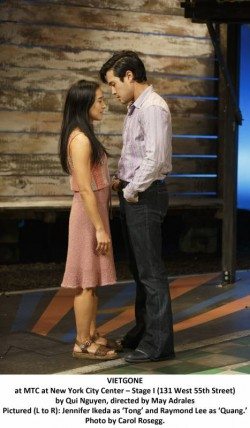
Vietgone is not the first attempt to portray the Vietnam War onstage, but its novel approach and innovative structure are not to be missed this season. Qui Nguyen’s play at Manhattan Theatre Club has all of the ingredients of solid entertainment: a captivating love story, over-the-top, action-packed fight scenes, comedy that hits all the bases, and sculpted men having their shirts ripped off. That being said, what truly brings this production to the next level is its ability to challenge normative liberalism and racial stereotypes in a way that is illuminating without being force-fed. It’s a delicate balance that is executed with wit and finesse by director May Adrales.
 The play begins with playwright Qui Nguyen, portrayed here by an excellent Paco Tolson, introducing himself, and reading the pre-show announcements in one of the most self-aware moments of this very self-aware piece. He then delves into “his” play, explaining that “though they [the two protagonists, Quang and Tong] are Vietnamese – born and raised there – for the purpose of this tale, it is to be noted that this will be their speaking syntax.” Without spoiling the plot, I’ll simply say that this “syntax,” as well as the ones adopted by characters portraying members of other racial groups, is one of the most effective and exciting devices that Nguyen employs. As the play continues, we find ourselves in a highly stylized, comic book-esque reality, enhanced by Tim Mackabee’s flexible set and Jared Mezzocchi’s vivid projections. Quang (Raymond Lee) and Tong (Jennifer Ikeda), both born and raised in Vietnam, find themselves in a refugee camp in Fort Chaffee, Arkansas after having fled their country. Quang has left a wife and two young children at home. Tong has such a strong guard up that she’s unable to let herself fall in love, despite her numerous admirers, including a white employee of the camp, whose pathetic attempts to communicate in Vietnamese (which for the sake of the story is spoken in English) parallel the accented, broken language that is usually reserved for the non-white characters we see on stage.
The play begins with playwright Qui Nguyen, portrayed here by an excellent Paco Tolson, introducing himself, and reading the pre-show announcements in one of the most self-aware moments of this very self-aware piece. He then delves into “his” play, explaining that “though they [the two protagonists, Quang and Tong] are Vietnamese – born and raised there – for the purpose of this tale, it is to be noted that this will be their speaking syntax.” Without spoiling the plot, I’ll simply say that this “syntax,” as well as the ones adopted by characters portraying members of other racial groups, is one of the most effective and exciting devices that Nguyen employs. As the play continues, we find ourselves in a highly stylized, comic book-esque reality, enhanced by Tim Mackabee’s flexible set and Jared Mezzocchi’s vivid projections. Quang (Raymond Lee) and Tong (Jennifer Ikeda), both born and raised in Vietnam, find themselves in a refugee camp in Fort Chaffee, Arkansas after having fled their country. Quang has left a wife and two young children at home. Tong has such a strong guard up that she’s unable to let herself fall in love, despite her numerous admirers, including a white employee of the camp, whose pathetic attempts to communicate in Vietnamese (which for the sake of the story is spoken in English) parallel the accented, broken language that is usually reserved for the non-white characters we see on stage.
As you could probably guess, the two fall in love. But despite the cliché nature of the story, it is the raw humanity that shines through even the most stylized moments that makes this production so poignant -- or, more specifically, the moments when the comic book world is shattered and reality strikes in a way that makes the truth even more raw and glaring. One such example occurs when Tong has a horrific nightmare that is so shocking, both contextually and visually, that no member of the audience can remain unaffected. It is the final scene, however, when Nguyen is able truly illuminate his meanings. Here, through the juxtaposition of the stylized and the real, and through developing a few key characters in ways that make them more than just action figures in his comic book, he reveals a perspective on the war, and on the human experience in general, that is so subtly devised that you almost feel like you came up with it yourself. Rest assured you didn’t. This is the doing of a highly skilled playwright. As you leave the auditorium, the endpoint is clear. This is not a play about the Vietnam War. This is not a play about Vietnamese people. It’s a play about human beings. It’s a classic love story, and an American one at that, developed through a lens that we simply haven’t experienced like this before. And let me tell you, it’s a refreshing change.